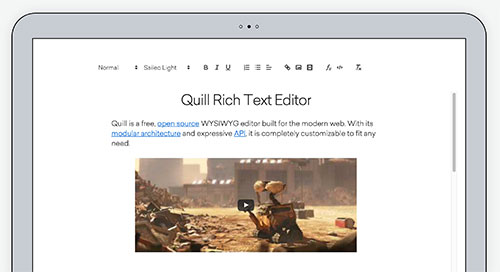Getting The Next Word In
The word processor doesn't just deserve scolding. Here's an honest look at some budding word-processor innovation efforts. They're worth writing home about.
"It's as though people cannot see text, they see only through text. Some people want to talk about knowledge, some people want to talk about collaboration … very few want to talk about text."
— Frode Hegland, the founder and an organizer of The Future of Text Symposium, an annual event that's designed to highlight discussions around better tying computing to the written word, discussing the way that text gets short shrift in revamps of the word processor. "The analogy that really stayed with me is, it's as though people want to talk about making a better window, but they don't talk about the view," he told me of the most recent event, held in August at Google's Mountain View, California headquarters.

Embracing text for the sake of text
The thoughts that our brain generates come out best when they work together consistently, in a single waveform.
The problem is, when you write stuff in a word processor, you're constantly pulled away from your ideas—you keep having to refer to your research, to keep looking stuff up, and on a computer, you're constantly switching between windows.
This creates a lot of friction and, mentally, you're stuck trying to sort between four or five different layers of messy thoughts. Things get chopped into pieces and connections fail to get made.
I do my best to avoid that kind of friction, but it's tough. So it was nice to find a kindred spirit on this issue in the form of Hegland, who has long spent time obsessed with this idea of "liquid information," or how words and ideas can flow together in one fluid swoop.
The British developer and academic, who has been focused on big-picture issues regarding information for decades, has developed an app specifically designed to solve this problem, a macOS add-on called Liquid | Flow that allows users to use key commands to select a piece of text and quickly perform an action on it without even thinking. (I've tried it; It's smooth like butter.)
Hegland's annual The Future of Text Symposium—which this year covered both interesting approaches to word processing like Jesse Grosjean's ultra-minimalist WriteRoom and outré concepts like Robert Scoble pondering text in the era of the Magic Leap—has a nice throw-out-all-the-cards kind of feel.
There were a couple of living legends in the room that day, including Vint Cerf, a co-inventor of the internet, and Ted Nelson, who came up with the word "hypertext." But in many ways, the direction of Hegland's career and his focus on the written word has been defined by a mentor who wasn't even at the August event: Douglas Engelbart, the early tech innovator whose "Mother of all Demos" helped shape the functionality of the desktop computer. (Engelbart died in 2013.)
Hegland said that his focus on the written word has in part been defined by his personal relationship with Engelbart, and he's trying to bring some of Engelbart's thinking to his word processor project Liquid | Author. The app, designed for both macOS and iOS and publicly released for the latter, has an interestingly narrow focus—rather than trying to revamp word processing all at once, it attempts to tackle how teachers and students interact with documents, an interaction that many people are familiar with.
"It should be instant for students to create a citation—web, book, article, whatever—and it should be equally instant for the teacher to check that citation," Hegland explained of the app's strategy.
Another goal with Liquid | Author, he says, is to use his Future of Text gatherings almost as a skunkworks project for new ideas that can be implemented in the project, which he'll likely focus on as he works on his Ph.D.
It certainly won't be a hugely commercial project—something Hegland is quick to admit—but it will be a fascinating one to watch.
"As the legend goes, when Steve Jobs 'borrowed' the ideas behind personal computing from Xerox PARC, many subtle, but crucial, differences were lost."
— A page on the website for the document editing tool Notion, explaining in part why the company built the tool, which combines word processing and document collaboration. The company talks at length on its website about trying to "bring back some of the ideas of those early pioneers." That isn't really an argument being made by a lot of companies making word processors these days. (FWIW, Notion is probably the most forward-thinking of the up-and-comers out there, a list that includes Dropbox Paper and Gingko.)
A modern take on the word processor that isn't really a word processor at all
Maybe the issue with our word processors isn't that there's too much crap. It's just that neither you nor your company cares about anyone else's.
The ambitious, Github-famous text editing tool Quill is designed to consider the process of text editing from this perspective. Rather than treating word processing as a single monolithic beast, it's an open-source project—hack it however you need it, thanks. Author and lead maintainer Jason Chen, who helped start the project while at SalesForce, suggests the strategy is intended to allow companies and end users that rely on the platform to create something that more specifically suits their needs.
"It was a common saying that 95 percent of features in Word are never used, but the problem is that different groups of people use a different 5 percent," Chen explained in an interview. "I think these big companies are looking for a tool that just does the 5 percent that they care about and skip the rest."
So far, the approach—which he says is inspired by both Medium's graceful, opinionated design and Etherpad's strong, hackable foundation—has won some prominent fans, such as Vox Media, Gannett, and Hubspot. And the hits keep coming. Last month, LinkedIn revamped its Medium-competing publishing platform to use Quill, with the engineering manager of the publishing platform praising the tool's technical power and flexibility.
"As LinkedIn publishing evolves, Quill’s underlying technology opens the door for rich features, such as collaborative editing and custom rich media types," the company's Jake Dejno wrote.
The strategy, Chen says, reflects a reframing of the place of word processing in the modern day. He argues that word processors generally haven't kept up with the interactivity of the internet (stuff like embeds, you know the deal); simultaneously, though, we have what Chen characterized as a "diminishing need for their strengths."
"The reasons we have traditionally used word processors has slowly been eroded away," he explained. "LinkedIn is replacing the resume, Github is replacing documentation, and blogging (and respective tools) have chipped into journalism. Even documents that are meant to be printed are largely being standardized and automated. Most letters in your physical mailbox today are probably from some bank that generated and printed it without touching Word."
By putting the rendering of words into the hands of the end user—and doing so, it should be said, with state-of-the-art technical standards—projects like Quill could redefine our relationship with the word processor … by, in some ways, removing it from the equation entirely.
So, where does the future stand for word processing in the long run? Are we still going to be using an all-in-one tool for handling the written word down the line here? In posing that question to Chen, he suggested that in the shorter run, companies will begin to use more specialized tools, but further down the line, he believes we may see significant changes in the way we interact with written words.
"In 15 years I think the input interface and the idea of a 'document' to be entirely reimagined," Chen suggests. "I don't think we'll be at telepathy in that timeframe but I can see a lot more speech and audio playing a larger role for input. Video is already augmenting the document, but VR could be ubiquitous by then."
But thinking of audio and video as a replacement for a written word, while an interesting idea, gives me pause—for a few reasons. One issue comes up as I click through the recording of my Skype conversation with Frode Hegland: I find the sound of my own voice terrible, because I tend not to speak as cleanly as I write. (Man, how do people deal with the fact that I'm a 35-year-old guy who repeatedly says "like" and "you know" in the middle of a conversation? No wonder this isn't a podcast.)
Hegland, who is much more eloquent than I am, suggested that natural language processing was potentially going to change the way that we write—particularly real-time summarization techniques that could tell you whether your story makes sense on the fly. He specifically pointed to the work of Bruce Horn, an early Macintosh developer who now works for Intel, as well as Stanford linguistics professor Livia Polanyi.
But, ultimately, Hegland still saw a place for the written word, as well as the tools that traditionally put those words there.
"Over the past few years I've come to appreciate that freedom of [mental] movement is the key," he said, highlighting the nature of liquidity in putting thoughts to the page. "When you look about the freedom of your own hands moving, you have such incredible freedom of movement."'
(Hegland isn't a Markdown fan like myself, but hey, pobody's nerfect.)
As long as the freedom of mental movement in my hands goes faster than my own voice, I'm probably going to have a need for a keyboard. But what about the next generation? Will word processors eventually get thrown out into the annals of history like a stream of old Motorola RAZRs and BlackBerry phones?
God, I hope not. I still have a lot of words to write.
:format(jpeg)/2017/06/tedium100416.gif)
/2017/06/tedium100416.gif)


/uploads/ernie_crop.jpg)